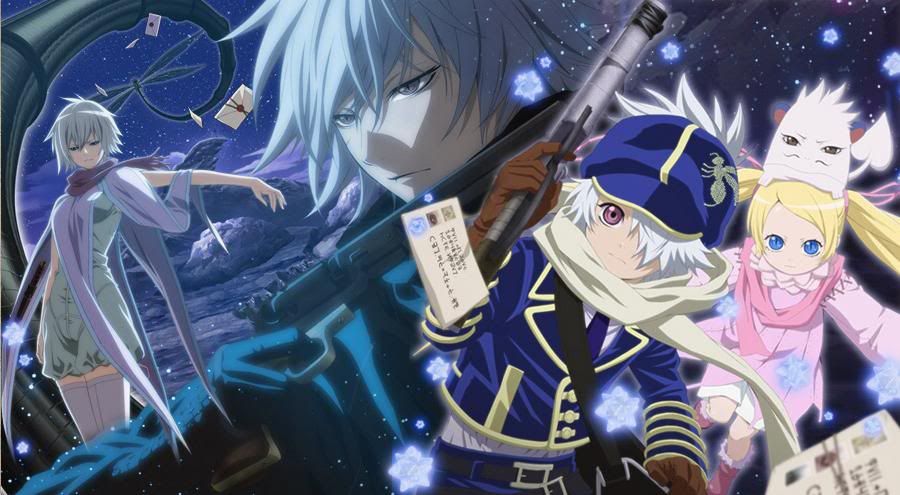Also known as Letter Bee (for some reason the fans prefer Tegami Bachi over the English translation, even though it's a literal and pretty straight forward translation, even Viz uses TB for their titles), this is a direct sequel to the first season that aired back in Fall 2009. So, for those of you who haven't seen the first season, this review is going to have some spoilers, heck, that image down there is a spoiler and there's just no way around them. You've been warned and, for those of you who want to go ahead and watch the first season, it's streaming on Cruchyroll.com (as well as the second season) and I'd advise watching episodes 1-11, 13, 17, 21-25. The rest are filler, some better than others, and you can certainly watch all the ones you want, but that cuts out the worst of the filler.
Tegami Bachi-Reverse
Summary: Continuing from where the first season left off on a cliffhanger, Lag is a Letter Bee (postal carrier) who delivers letters in the sunless world of Amberground and searching for the missing Letter Bee who inspired him, Guache Suede. Things have just gotten more complicated however with an anti-government conspiracy and the slow revelation that the government itself isn’t that nice either.
The Good: Tegami Bachi is one of the few manga I follow these days and I just love how the manga-ka (Hiroyuki Asada) puts together their story. It flows well, all the characters are fleshed out and smart, and Asada knows how to put subtle hints about TB’s larger plot into the background*. So when the story follows the manga I love everything about the story and consider it a great piece of work. The story uses all the characters on a regular basis, slips in foreshadowing early on (in fact, the anime-original ending was hinted early on, not just manga plot points) and many of the side characters are given development without having to veer away from the main plot.
The Bad: When the story is not following the manga plot line however, it just doesn’t feel right. In fact, the two split at the same point that the scanlations halted at but I was immediately able to tell because of how the characters started acting (the next chapter came out soon after and confirmed it). It’s hard to describe, but the all characters simply feel a bit less mature, less complex, and less competent, causing them to solve the same problems very differently than how the manga did. They take a different approach to taking down Reverse, have different emotions over the problem, and simply don’t seem quite like the same characters from earlier on. The writing isn’t bad, solidly average but hardly bad, but fans of the manga are less likely to enjoy the anime original ending.
The Art: One thing lost in the transition between manga and anime was the manga’s unique color pallet (here versus the above image, interestingly enough, the lighting in the manga is probably more accurate to what a world lit by an artificial sun would look like) but the second opening (which appears a few episodes after the song changes, opening 1.5 is a clip show) and episode 33 & 34 had interesting color schemes (involving green instead of the manga’s orange) which looked simply gorgeous with intense color rivaling what Star Driver was doing.
The Music: The second opener was sung by the same artist who did the first opener in the first season which was a nice way of connecting the story, especially since most anime don't reuse singers. The closers follow the tradition of having chibified versions of the characters running around and the second closer had a particularly catchy song.
In the end, I liked the anime at times because I loved the manga and when they split I just couldn't get as excited about it. I'm still buying the manga (so glad that Viz is now going to release three volumes a year instead of just two) and I'm not sure if I would buy the anime if it got released over here. It would probably depend on the extras offered but for now I just won't worry about that.
*I’m impressed at anyone who can put in major foreshadowing in the first four pages of the manga and have no one notice because they were too busy looking at the other possibly foreshadowing imagery, that’s talent.
